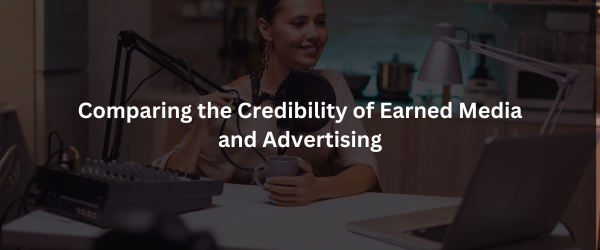
What do Best PR Strategies have in common
May 30, 2023
Mastering Press Releases: 5 Common Blunders to Steer Clear Off
May 31, 2023In today’s fast-paced digital world, businesses face a constant challenge of capturing consumer attention and building credibility. Two commonly used methods for achieving this are earned media and advertising. While both approaches aim to promote brands and products, they differ significantly in terms of credibility. In this blog, we will delve into the comparison between earned media and advertising and explore their respective impact on consumer trust.
Earned Media and Advertising
The Power of Organic Publicity and Authentic Endorsements
Earned media refers to the organic publicity generated through public relations efforts, word-of-mouth, or social media shares. It is essentially the positive coverage and mentions a brand receives through third-party channels. This type of exposure carries inherent credibility, as it relies on the opinions and experiences of unbiased individuals or media outlets. When people hear about a brand through a friend’s recommendation or a news article, they tend to perceive it as more trustworthy.
On the other hand, advertising involves paid promotional activities that aim to influence consumer behavior. While businesses have control over the message and placement in advertising, the commercial nature of advertisements often prompts questioning of their credibility. Consumers are aware that advertisers have a vested interest in promoting their products, which can lead to skepticism. However, well-executed and transparent advertising campaigns can still resonate with audiences and build trust over time.
Balancing Creativity and Credibility for Effective Brand Promotion
The credibility of earned media stems from its authentic and unbiased nature. Consumers are more likely to trust recommendations from friends, influencers, or industry experts because they perceive them as genuine opinions. Moreover, earned media often provides in-depth information and context about a brand or product, allowing consumers to make informed decisions.
On the other hand, advertising can leverage creativity and storytelling to capture attention. Well-crafted ads can evoke emotions and build brand recognition. Advertisements also provide businesses with greater control over their messaging, enabling them to highlight key features, benefits, and unique selling points. However, their inherent promotional nature can create a sense of skepticism, as consumers understand that the ultimate goal is to drive sales.
Read more: Can Public Relations help in driving sales?
Strengthening Credibility and Reaching a Wider Audience
The ideal approach for building credibility involves a combination of earned media and advertising. By integrating earned media into advertising campaigns, businesses can enhance their credibility and reach a wider audience. Leveraging earned media through social proof, such as testimonials or user-generated content, can lend authenticity to advertisements. Additionally, aligning advertising messages with the values and mission of the brand can reinforce credibility and build trust among consumers.
In conclusion, while both earned media and advertising play crucial roles in brand promotion, earned media possesses inherent credibility due to its organic nature and unbiased endorsements. Advertising, on the other hand, offers control and creativity but is often viewed with a degree of skepticism. A balanced strategy combining earned media and advertising enhances credibility, captures trust, and drives business success.
You might also like: Difference between Public Relations and Advertising




